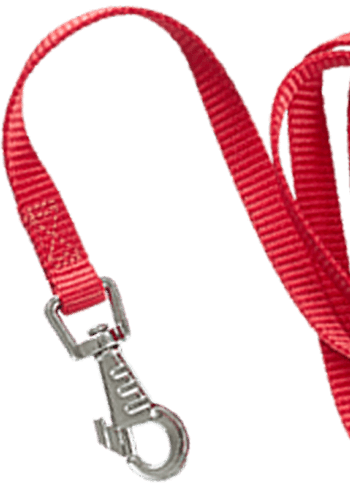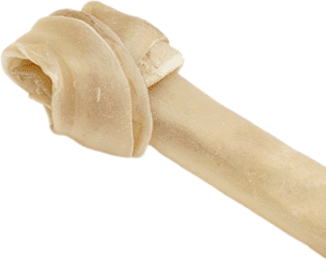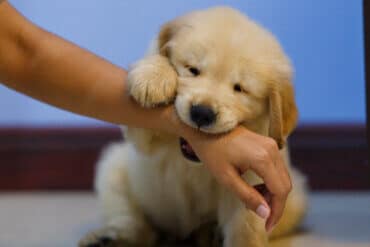


Golden Retrievers are known as ideal family dogs for a good reason: They’re patient, loyal, and friendly. But, they’re still dogs — and sometimes their instincts take over.
While Goldens aren’t known for being aggressive, both puppies and adult dogs might bite as an instinctual reaction or while roughhousing.
In reality, more than 4.5 million people are bitten by dogs each year in the U.S. Although only a tiny percentage have to seek medical attention, the experience can be unnerving for the person being bit and the dog owner. That’s why teaching bite inhibition is crucial.
When a happy-go-lucky breed like the Golden Retriever is less inclined to bite — thanks to proper training and socialization — you don’t have to worry about problems. But to help your pup, you should understand why puppies and older dogs bite and what type of training will inhibit their inclination to bite.
A little puppy biting might seem harmless, but if the behavior isn’t discouraged, it could continue into adulthood.
So, why do Golden puppies bite so much?
Like human babies, puppies also teethe. Teething starts around three weeks when their first milk teeth come in. Once this process begins, your puppy will want to bite and chew on almost everything, including you!

Biting helps relieve the pain in their gums and soothes some of the irritation as new teeth come in.
But that’s not the only reason Golden Retriever puppies bite: They also bite within their pack. It’s normal for dogs to roughhouse when they’re still with their mothers and siblings.
In some cases, puppies may bite if they’re overtired: This is what we call ‘nippy’ behavior, and it occurs when they’re exhausted, annoyed, or frustrated.
Retrievers were originally bred to pick up and retrieve prey, which means using their mouths as a tool is part of their genetics. In the 19th century, hunters would use this breed to help them hunt waterfowl and other game. Once they shot down a bird, the dog would find it, pick it up in its mouth, and bring it back.
Another factor is those foundational canine instincts. Dogs are animals, and you’ll notice a lot of instinctual behaviors in your puppy’s day-to-day activities. Guarding people, digging holes, turning around before lying down, and biting — these behaviors are part of the canine DNA.
Your Golden Retriever puppy will mirror its ancestors’ behavior: The first wolves began to befriend our ancestors around 10,000 to 15,000 years ago.
These early versions of domesticated dogs developed strong social instincts, which is why dogs today can become nervous when separated from their packs.
When they feel alone and anxious, they might bark, howl, or start chewing or biting on anything they can find until you come home.

This same desire to be a part of the pack is why it’s possible to teach your puppy to stop biting. Goldens, in particular, seek the approval of their owners. So as you show them what behaviors are acceptable and which ones aren’t, they will pick up on good behavior.
Training your puppy not to bite unwanted things and be gentle when using their mouth is known as bite inhibition. Even though puppy bites don’t hurt nearly as much as adult bites, it’s still essential to help train your puppy out of this phase. Otherwise, he’ll continue it well into adulthood.
Most Golden Retriever puppies outgrow their biting habits. Usually, when teething is over and all their adult teeth have come in — at around six and seven months old — you can expect the puppy-biting phase to end.
However, not every pup will stop on its own. Some will need training to break the habit.
No matter how friendly Goldens are, all dogs have the potential to get aggressive and attack, especially if they’re not appropriately socialized or feel threatened.
Adult Goldens rank 30th overall for bites and aggressive attacks, so they’re not prone to biting people. Of bites reported from 1984 to 2014, Golden Retriever bites account for one bite every two years.
If your Golden Retriever is biting, it might have underlying issues that require addressing.
You might expect some biting from your Golden Retriever puppy. But seeing your older Golden bite can be alarming.
Even the calmest dogs might bite if provoked. But if you notice a pattern or a developing habit, you’ll want to find out what’s behind the behavior so you can correct it. The better you understand where your dog is coming from, the easier it is to implement a solution.
Here are the leading factors that might cause an adult dog to bite:
If a Golden Retriever feels like it has to shift into protective mode — whether it’s guarding you, your home, or its favorite chew toy — it can become aggressive.
For instance, say an intruder breaks into your home. As far as your Golden is concerned, that’s a stranger encroaching on its territory. As a reaction, your dog might bark or growl. And, if they feel threatened enough, they might try to bite the intruder.
This is an example of territorial aggression. There are a few other types of canine aggression, including the following:
Playful biting is a lot like Golden Retriever puppy biting. The dog perceives biting as a normal part of rough play and doesn’t view it as unwanted behavior.
This type of biting occurs when the dog never outgrows the puppy-play biting stage. Maybe they didn’t have enough bite inhibition experiences from their owner motivating them to stop or other dogs conditioning them to taper down their behavior.
If playfulness is behind the problem, teaching bite inhibition now by reinforcing positive behavior can go a long way in helping your dog drop their bad habits.
Like people, dogs get annoyed from time to time. For example, if a rambunctious puppy continually nips at an adult Golden Retriever, the older dog might snap at the younger puppy.
Frustrated biting can also happen with children who don’t understand a dog’s limits. Goldens are famous for their patience with kids, but it’s also important to teach your child how to respect the dog’s boundaries to prevent bites and keep them safe.
Pain and discomfort can also trigger biting, growling, and other seemingly aggressive behaviors. This can happen when a dog is in pain because of a health issue. For example, if they have a joint disease that’s causing joint pain and inflammation, they might bite or growl as an instinctive reaction to their discomfort.
Golden Retrievers are genetically predisposed to several conditions that can cause pain and discomfort, including the following:
Getting your Golden Retriever puppy from a reputable breeder can help to reduce the chances that your dog will develop these and other health conditions. However, there’s always a risk. The Golden Retriever breed has one of the highest cancer rates. And older dogs, in general, are more susceptible to disease.
Because even the most well-bred Goldens can develop a health condition, it’s important to bring your dog to a licensed veterinarian regularly so they can recognize and treat any issues. If you notice your dog starting to bite and growl for no apparent reason, it also might be worth talking to your vet to rule out health problems.
You can train your puppy to stop biting. But as every dog has a unique personality, you might need to work through different methods before successfully teaching bite inhibition. For example, if socialization training isn’t effective, you can move on to a different method, such as redirection or deterrence.
Here are three methods you can use to teach your Golden Retriever puppy not to bite. It’s also possible to achieve positive results with an adult Golden — just give your dog time to adjust to their new expectations.
Puppies who are properly socialized learn bite inhibition while nursing and playing. As your dog’s puppy teeth come in, their mother will indicate when those sharp little pearly whites are offensive.
Other dogs, including siblings and older dogs, might signal that too much rough play isn’t acceptable by growling or showing their teeth.
Both of these social feedback mechanisms help to teach a puppy to bite softly or not at all. That’s why it’s essential to expose your dog to a broadening environment as they get older. Bringing your puppy to meet other playful pups or taking them to the dog park when they are ready can help them learn not to bite.
Social interactions like meeting new people and engaging with children at a young age will set boundaries in your puppy’s mind about what’s acceptable.
A reputable breeder will also spend time socializing your Golden Retriever puppy with both other dogs and people. These interactions can help your puppy learn how to be gentle before you even bring them home.
Redirection is the process of resetting your dog’s attention to a better option. The key to this training technique is redirecting their focus before your dog can react.
For example, if you’re playing with your puppy and you notice they’re starting to get worked up, offer them a toy before they start gnawing on your hand.

By giving them an alternative item to chew, they won’t start building a playful-biting habit with humans.
Of course, you’re not always going to be able to redirect behavior in time — but that’s okay. When your Golden does start playfully biting you, their sibling, or the extremely patient family cat, gently remove your pup from the situation so they’re ready to start over and learn again.
The name of the game here is to deter your puppy from having a satisfying experience when they start biting.
There are a couple of ways deterrence training can work when teaching your Golden Retriever to stop biting. First, you can ignore your puppy’s unwanted behavior. Golden Retriever puppies want to please their owners. But they’ll also settle for your attention, in general.
By withholding your attention when your puppy tries to bite your clothing, hand, or something else they shouldn’t have in their mouth — and rewarding positive behavior with treats and praise — you teach them that biting doesn’t get them anywhere, but chewing on their toy does.
Another option is to use a safe deterrence spray for puppies. For example, if your puppy has a habit of biting your furniture, you can apply an anti-chew spray like a bitter apple or bitter cherry. Eventually, your dog will start associating that fun thing to chew on with an awful taste and lose interest.
Know that positive reinforcement is your best friend, no matter what training you use to teach your Golden Retriever to give up on biting.
Puppies don’t understand yelling or anger, so scolding will only confuse your pup. But because they love being loved by you — and eating tasty treats — you’ll have an easier time teaching bite inhibition with a positive approach.
Successfully training your Golden Retriever comes down to understanding why the biting occurs. Think about when it happens and try to figure out what might trigger your dog, whether it’s protective instincts, fear, or something else.
If your dog continues to bite after you’ve tried to train them, it may be time to bring in other resources. You can contact expert dog trainers who have experience with biting. Some trainers specialize in addressing underlying issues, such as aggression.
Playful puppy biting is completely normal — but that doesn’t mean you should let your pup continue biting and chewing on things they shouldn’t have in their mouth. Otherwise, your dog might never grow out of their habits.
Instead, use socialization and puppy training tools to help your little Golden Retriever learn how to respond to different environments, triggers, and people. With social and lifestyle training, puppies are exposed to various situations, so they learn how to behave around other people, at the park, vet, and home.
Ultimately, education during puppyhood is the foundation of a happy and healthy adulthood.
If you notice your new puppy biting, don’t worry right away. It’s a part of learning boundaries and how to behave in different environments. However, taking advantage of your pup’s early years is important to socialize them and teach them what they need to know about life.
Dog training isn’t just learning how to sit and follow a command. At Snowy Pines, we teach our White Lab and English Cream Golden Retriever puppies the skills they need to be happy, tail-wagging dogs, including bite inhibition. Check out our Wagology curriculum and lifestyle modules today!